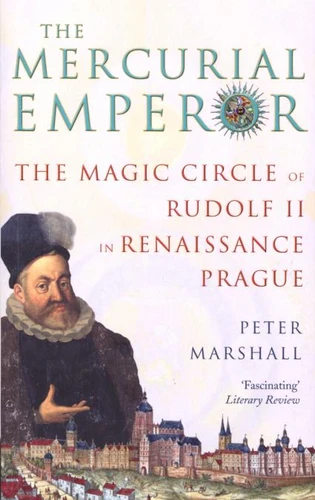The Mercurial Emperor. The Magic Circle of Rudolf II in Renaissance Prague
Par :Formats :
Disponible dans votre compte client Decitre ou Furet du Nord dès validation de votre commande. Le format ePub protégé est :
- Compatible avec une lecture sur My Vivlio (smartphone, tablette, ordinateur)
- Compatible avec une lecture sur liseuses Vivlio
- Pour les liseuses autres que Vivlio, vous devez utiliser le logiciel Adobe Digital Edition. Non compatible avec la lecture sur les liseuses Kindle, Remarkable et Sony
- Non compatible avec un achat hors France métropolitaine
 , qui est-ce ?
, qui est-ce ?Notre partenaire de plateforme de lecture numérique où vous retrouverez l'ensemble de vos ebooks gratuitement
Pour en savoir plus sur nos ebooks, consultez notre aide en ligne ici
- Nombre de pages288
- FormatePub
- ISBN978-1-4464-2664-7
- EAN9781446426647
- Date de parution28/11/2013
- Protection num.Adobe DRM
- Infos supplémentairesepub
- ÉditeurVintage Digital
Résumé
In the late 16th century the greatest philosophers, alchemists, astronomers, painters, and mathematicians of the day flocked to Prague to work under the patronage of the Holy Roman Emperor Rudolf II, an emperor more interested in the great minds of his times than in the exercise of his immense power. Rarely leaving Prague Castle, he gathered around him a galaxy of famous figures: among them the painter Arcimboldo, the astronomer Tycho Brahe, the mathematician Johannes Kepler, the philosopher Giordano Bruno and the magus John Dee.
Fascinated by the new Renaissance learning, Rudolf found it nearly impossible to make decisions of state. Like Faust, he was prepared to risk all in the pursuit of magical knowledge and the Philosopher's Stone which would turn base metals into gold and prolong life indefinitely. But he also faced threats: religious discord, the Ottoman Empire, his own deepening melancholy and an ambitious younger brother.
As a result he lost his empire and nearly his sanity. But he enabled Prague to enjoy a golden age of peace and creativity before Europe was engulfed in the Thirty Years' War. Filled with angels and devils, high art and low cunning, talismans and stars, The Mercurial Emperor offers a captivating perspective on a pivotal moment in the history of Western civilisation.
Fascinated by the new Renaissance learning, Rudolf found it nearly impossible to make decisions of state. Like Faust, he was prepared to risk all in the pursuit of magical knowledge and the Philosopher's Stone which would turn base metals into gold and prolong life indefinitely. But he also faced threats: religious discord, the Ottoman Empire, his own deepening melancholy and an ambitious younger brother.
As a result he lost his empire and nearly his sanity. But he enabled Prague to enjoy a golden age of peace and creativity before Europe was engulfed in the Thirty Years' War. Filled with angels and devils, high art and low cunning, talismans and stars, The Mercurial Emperor offers a captivating perspective on a pivotal moment in the history of Western civilisation.
In the late 16th century the greatest philosophers, alchemists, astronomers, painters, and mathematicians of the day flocked to Prague to work under the patronage of the Holy Roman Emperor Rudolf II, an emperor more interested in the great minds of his times than in the exercise of his immense power. Rarely leaving Prague Castle, he gathered around him a galaxy of famous figures: among them the painter Arcimboldo, the astronomer Tycho Brahe, the mathematician Johannes Kepler, the philosopher Giordano Bruno and the magus John Dee.
Fascinated by the new Renaissance learning, Rudolf found it nearly impossible to make decisions of state. Like Faust, he was prepared to risk all in the pursuit of magical knowledge and the Philosopher's Stone which would turn base metals into gold and prolong life indefinitely. But he also faced threats: religious discord, the Ottoman Empire, his own deepening melancholy and an ambitious younger brother.
As a result he lost his empire and nearly his sanity. But he enabled Prague to enjoy a golden age of peace and creativity before Europe was engulfed in the Thirty Years' War. Filled with angels and devils, high art and low cunning, talismans and stars, The Mercurial Emperor offers a captivating perspective on a pivotal moment in the history of Western civilisation.
Fascinated by the new Renaissance learning, Rudolf found it nearly impossible to make decisions of state. Like Faust, he was prepared to risk all in the pursuit of magical knowledge and the Philosopher's Stone which would turn base metals into gold and prolong life indefinitely. But he also faced threats: religious discord, the Ottoman Empire, his own deepening melancholy and an ambitious younger brother.
As a result he lost his empire and nearly his sanity. But he enabled Prague to enjoy a golden age of peace and creativity before Europe was engulfed in the Thirty Years' War. Filled with angels and devils, high art and low cunning, talismans and stars, The Mercurial Emperor offers a captivating perspective on a pivotal moment in the history of Western civilisation.












